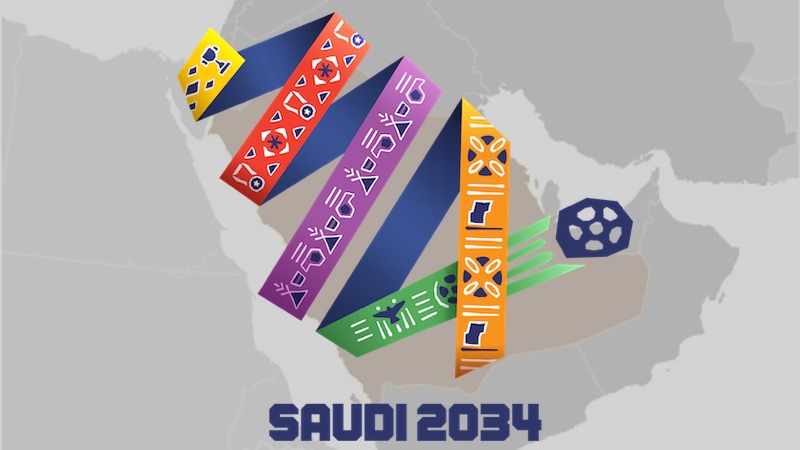FIFA has done it once more. With its trademark flair for innovative interpretation, dubious reasoning, and assertive confidence, the global football governing body has declared the Kingdom of Saudi Arabia suitable for hosting the biggest sporting event on the global calendar – aside from the Olympics. The FIFA Men’s World Cup will, once again, take […]


FIFA has done it once more. With its trademark flair for innovative interpretation, dubious reasoning, and assertive confidence, the global football governing body has declared the Kingdom of Saudi Arabia suitable for hosting the biggest sporting event on the global calendar – aside from the Olympics. The FIFA Men’s World Cup will, once again, take place in a desert nation, where football is a relatively recent development yet clever opportunism is not.
There are certainly several factors playing in favor of Saudi Arabia, which put forth its official bid to host the tournament in July of this year. Firstly, putting on such massive events can be overwhelmingly expensive for the nation, city, and its people. This discouragement often narrows the pool of competitors. (Saudi Arabia was the only contender for the 2034 tournament.)
The nation has also embarked on a sporting strategy that currently encompasses over 900 sponsorship agreements, with one-third traceable to the country’s US$925 billion sovereign wealth fund. Significant investments have targeted football, be it through sponsorships, partnerships, or direct investments. These initiatives are crucial to the Kingdom’s “Vision 2030” agenda.
A report from Denmark’s publicly funded sports ethics institute Play the Game highlights a level of sophistication and adaptability among the Kingdom’s sports leaders. “In contrast to many global sports counterparts, Saudi sports leaders maintain multiple roles, merging leadership in the sports sector with prominent roles within the state machinery, granting them unmatched political and financial power.”
These individuals are flexible in nature, occupying positions in the sporting arena, essential ministries, state-owned entities, and even the sovereign wealth fund. The report’s authors highlight Yasir Al-Rumayyan as a case in point, who serves as governor of the Public Investment Fund and chairman of the national oil and gas corporation Aramco, while also being actively involved in sports. This allows for a seamless “shift between being a sports leader, financial mogul, or state official, based on the situation.”
Considering the Kingdom’s extensive investment in football, FIFA’s evaluation of the bid was unlikely to be overly critical. Furthermore, football’s primary governing body has its own partnership with Aramco, announced in April this year. “This collaboration,” said FIFA President Gianni Infantino, “will help FIFA successfully execute its flagship tournaments in the coming four years and, as with all our commercial partnerships, allow us to better support our 211 FIFA member associations worldwide.” Infantino also praised Aramco’s “impressive track record of backing premier events” while expressing interest in “nurturing grassroots sports initiatives.”
The announcement did not resonate well with over a hundred international women footballers who signed an open letter to the FIFA president denouncing the Kingdom’s elaborate sportswashing campaign. “Saudi authorities have allocated billions to sports sponsorship to divert attention from the regime’s appalling human rights image, but their treatment of women speaks volumes.” These included the incarceration of Salma al-Shebab, Manal al-Gafiri, Fatima al-Shawarbi, Sukaynah al-Aithan, and Nourah al-Qahtani.
The letter further criticized Saudi authorities for infringing “not only on women’s rights but on the freedoms of all citizens as well. Can you envision LGBTQ+ players, many of whom are icons in our sport, being expected to promote Saudi Aramco during the 2027 [Women’s] World Cup, the national oil entity of a regime that criminalizes the very relationships they maintain and the values they embody?”
These were merely murmurs to FIFA, whose evaluation appeared almost embarrassingly favorable, scoring 4.2 out of 5. The risk assessment concerning human rights received a “medium” rating. The Saudi Gazette gushed with approval at an evaluation deemed “the highest in the tournament’s history.”
In its evaluation, FIFA claimed it had “consulted multiple sources, including the bidder’s human rights policy, the required context assessment, and direct commitments from the hosting nation and cities, along with all hosting contracts, which notably include provisions for upholding human rights concerning the competition.”
The governing body reiterated the familiar yet flawed assertion that the sport had “significant potential” for reform and could “promote positive human rights outcomes”. Riyadh had also demonstrated a “strong commitment to sustainability,” though FIFA acknowledged that the climate presented an “elevated risk.”
Many of the conclusions were derived from a report titled “Independent Context Assessment Prepared for the Saudi Arabian Football Federation concerning the FIFA World Cup 2034”. (The term “independent” in many reports often implies the opposite.) The assessments were destined to be favorably tailored. For instance, it was conducted by the Saudi branch of the Clifford Chance law firm. The report also neglected to consider a range of pertinent international human rights treaties since the Kingdom had either not ratified them or because the Saudi Football Federation did not regard them as relevant to the evaluation. There was no mention, therefore, of freedom of expression, association, and assembly, let alone discrimination against LGBTQI+ populations, the right to freedom of religion, or specific labor rights like trade union membership.
Human rights organizations have been active in redirecting attention back to the Kingdom’s troubled history. In a statement on October 28, eleven groups including Amnesty International, Human Rights Watch, Football Supporters Europe, labor organizations, Gulf human rights activists, and a Saudi diaspora group cautioned that a poor human rights record had deteriorated “under the de facto leadership of Crown Prince Mohammed bin Salman, who has overseen a rising number of mass executions, torture, enforced disappearances, severe curbs on free expression, repression of women’s rights under the male guardianship system, discrimination against LGBTI+, and the killing of numerous migrants at the Saudi Arabia-Yemen border.” The Kafala (labor sponsorship) system, along with the ban on trade unions, continued to lead to the exploitation of migrant workers.
Not everything has been smooth regarding the endorsement of FIFA’s decision, at least among various football organizations whose approval is also sought. However, even there, Saudi sporting strategy has been visible to quell opposition.
The Asian Football Confederation (AFC), for example, was unlikely to oppose the choice, given Riyadh’s partnership with the AFC as a global ally between 2021 and 2024, a relationship that was renewed in July 2024 for an additional five years.
At the time of writing, the Football Association remains uncertain as to whether an official endorsement will be forthcoming. While the BBC has been informed that FA officials are concerned about the human rights implications, there is also anxiety that accusations of hypocrisy will arise should the organization participate in the tournament afterward. It appears no one wants to be left out of the celebration. And the Saudi authorities are acutely aware of this reality.















FIFA’s altered conclusions regarding key decisions and policies often spark debate within the football community. It’s crucial for the organization to maintain transparency and consistency in its actions to uphold the integrity of the sport. While adjustments may be necessary as new information comes to light, clear communication is essential to foster trust among players, fans, and stakeholders alike. Balancing the need for evolution with the foundational principles of fair play and accountability will be key in preserving the sport’s reputation.